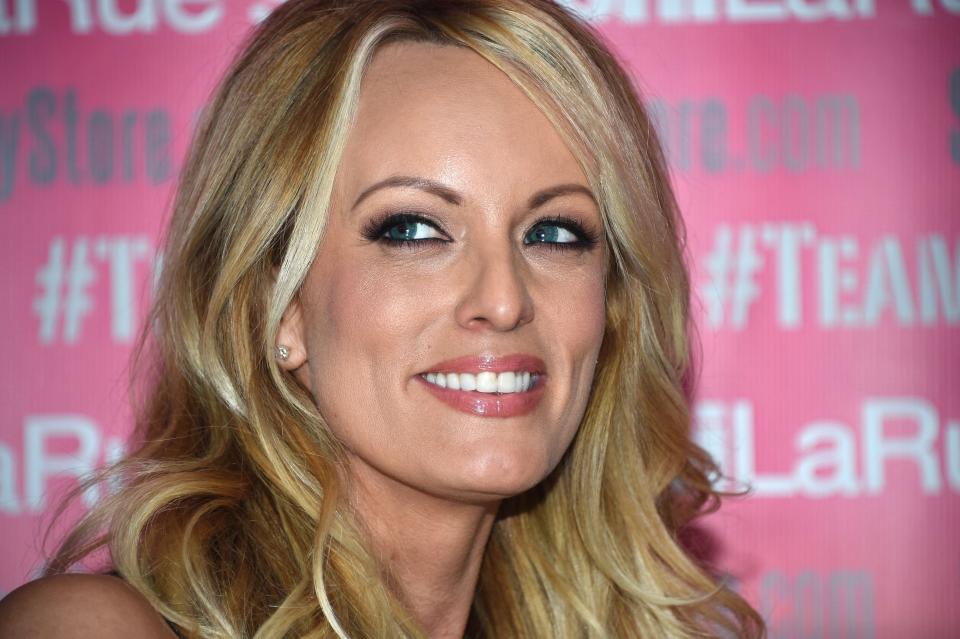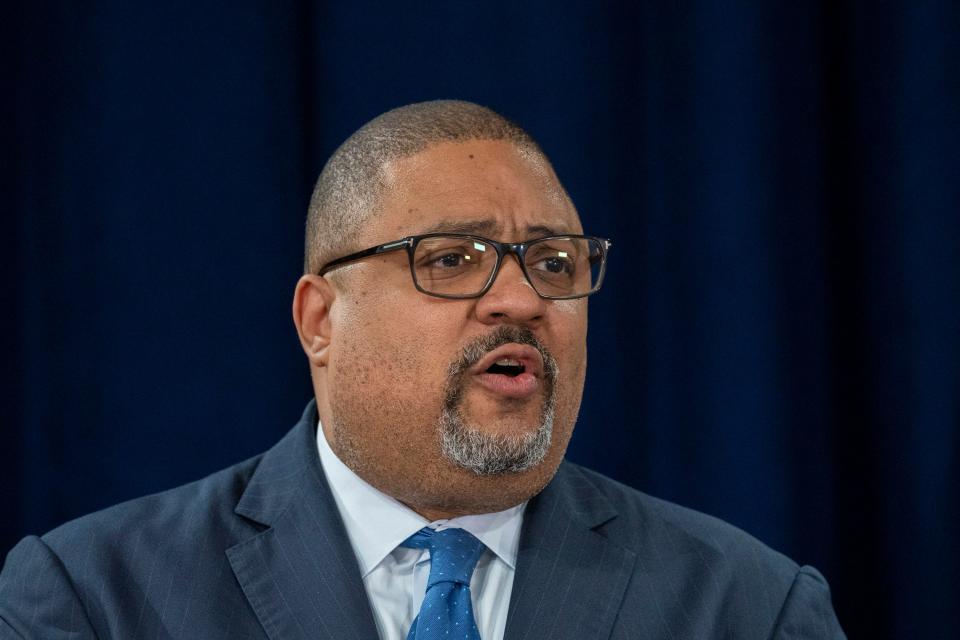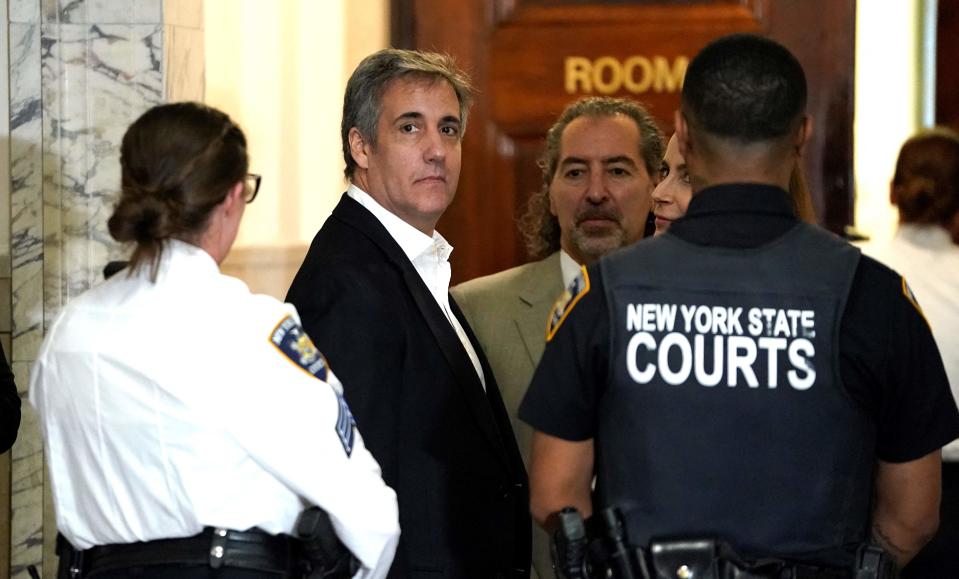Donald Trump's historic New York hush money trial is set to start Monday: What to know
Barring a last-minute turn of events, a former American president will go on criminal trial for the first time in the nation's history on Monday.
Donald Trump is fighting 34 felony counts of falsifying business records to cover up a hush money payment to porn star Stormy Daniels in the run-up to the 2016 presidential election. If convicted, the charges could land the presumptive Republican presidential nominee in prison: Many legal experts say a realistic sentence ranges from just probation to as much as four years behind bars.
It's a case that is sure to divide the country. Republican voters delivered electoral victories for Trump in nearly every Republican primary held this year, despite knowing Trump faces four criminal cases, including the New York charges. Trump has portrayed both Manhattan District Attorney Alvin Bragg and trial Judge Juan Merchan as biased against him.
"There are some people who are just going to see this as a political trial, another one in New York where Trump is certainly not well liked," Hank Sheinkopf, a New York City-based political consultant who worked for former President Bill Clinton, told USA TODAY.
"And then there are others who will see this as a way to deal with an illegality that should not have occurred ? we're talking about paying off a porno star," Sheinkopf said
Jury selection is set to start Monday, just over a year after Bragg announced the indictment against Trump on April 4, 2023. The trial is expected to last between six and eight weeks, according to a media advisory from the court.
A financial records case that starts with a sex story
Twelve jurors will be asked to decide whether the real estate mogul falsified business records at the Trump Organization in order to conceal or commit another crime ? a purpose that turns the acts into felonies under New York law.
Prosecutors allege Trump reimbursed his former lawyer, Michael Cohen, for the $130,000 hush money payment through a series of checks, falsely labeling them as payments for legal services. That concealed a federal election law violation because the $130,000 payment was meant to help Trump's 2016 election and exceeded campaign contribution limits, according to the prosecution. They also say the records were meant to conceal plans to violate state tax and election laws.
Trump has pleaded not guilty to the charges and recently submitted a frenzy of legal filings trying to delay the trial, so far to no avail.
Dueling 'election interference' claims
Both sides have framed the case as being about election interference ? but they are talking about different elections.
Manhattan District Attorney Alvin Bragg has said the case is about falsifying records in order to unlawfully interfere with the 2016 election.
"The core of it's not money for sex," Bragg said in a December WNYC radio interview. "We would say it's about conspiring to corrupt a presidential election and then lying in New York business records to cover it up."

Cohen paid Daniels less than two weeks before the Nov. 8 Election Day, and at a time when the Trump campaign was still reeling from the Oct. 7 release of the infamous "Access Hollywood" tape, in which Trump crudely described kissing women and grabbing their genitals. "When you're a star, they let you do it," he said.
Trump feared another scandal that could hurt his standing with female voters, according to prosecutors. "Ultimately, with pressure mounting and the election approaching, the Defendant agreed to the payoff," they said in a case document.
Trump has said the case – and all his criminal and civil cases – are intended to harm his prospects in the 2024 election. They represent "an illegal attack on a Political Opponent" and "Election Interference at its Best," he posted on his Truth Social media platform Wednesday.
Norman Eisen, a Brookings Institution senior fellow who served as special counsel to the House Judiciary Committee during Trump's first impeachment, agreed with Bragg's election-interference framing of the case.
"The reason that Donald Trump made hush money payments and then covered them up, triggering the financial falsification charges in New York, over 30 of them, is because he did not want another damaging sex scandal at the end of the 2016 election, right after Access Hollywood ? it could have tanked him," Eisen told USA TODAY.
How the trial will unfold
The trial will start with jury selection, a days- or weekslong process in which both sides will try to suss out potential personal agendas towards Trump.
After jury selection, the two sides are expected to make opening arguments. The prosecution will then call witnesses and introduce evidence, while Trump's team tries to poke holes in the prosecution's case. After that, Trump's side will have the option of putting on their own defense, including having Trump testify.
On Friday, Trump said at a Palm Beach news conference that he plans to testify in the New York trial.
"I’m testifying. I tell the truth. I mean, all I can do is tell the truth. And the truth is that there's no case, they have no case," Trump said.

More: Did Donald Trump rape E. Jean Carroll? Here's what a jury and judge said.
Trump also said he was going to testify when it was the defense's turn to call witnesses in his New York civil fraud case, but he backed out the day before his lawyers said he would take the stand. Trump did testify for just a few minutes in his latest of two trials against E. Jean Carroll, who sued him for defamation over his denials and attacks soon after she came forward with rape allegations against him.
Theoretically, the trial could be halted somewhere along the way. For example, a lawyer or witness could say something in front of jurors that the judge rules is improper and creates too much prejudice against one side or the other, forcing the judge to declare a mistrial.
If that doesn't happen, the two sides will give closing arguments, and then Trump's fate will be in the jury's hands.
Will the trial be televised?
The trial will not be televised, in keeping with general New York court policy. Reporters will be present in the courtroom as well as in at least one overflow room in which proceedings will be streamed.
Trump may hold news conferences outside the courthouse, or speak to the news media in the hallway, as he has in his other court cases.
Who are the witnesses?
Testimony could be embarrassing for the former president, even if Trump disputes it. Stormy Daniels is on the prosecution's witness list and may share her story of having sex with Trump in 2006, soon after Melania Trump gave birth to their son, Barron. The former president vehemently denies Daniels' claim.
Judge Juan Merchan has also ruled that other witnesses who received hush money payments before the 2016 election may testify because steps taken to secure their stories "complete the narrative" in the prosecution's case.
That includes former Playboy model Karen McDougal. Prosecutors say she received $150,000 from the The National Enquirer's parent company, American Media Inc., to keep quiet about an alleged affair with Trump ? which he denies.

Michael Cohen could also take a turn on the stand. Trump's team bitterly fought the proposition that he could testify at all, calling Cohen an admitted liar. Cohen stated at Trump's New York civil fraud trial that he lied when he pleaded guilty to federal tax evasion. He engaged in "tax omission," not tax evasion, he said.
However, Merchan said Trump hadn't shown Cohen had lied in this case, and Merchan hadn't found any applicable law or court ruling that blocked a prosecution witness from testifying because the witness' credibility was previously called into question.
Former White House spokesperson Hope Hicks is also expected to testify, according to NBC News and CNN, which cited a source familiar with the matter. Hicks was Trump's 2016 presidential campaign press secretary and may have been present for discussions about the Daniels hush money payment, according to court filings dealing with an FBI investigation. A lawyer for Hicks previously denied she participated in hush money payment conversations on Oct. 8, 2016, a day when she and Cohen spoke several times.
Who are the lawyers?
Ex-U.S. Justice Department official Matthew Colangelo is expected to be a key player for the prosecution team. When he was in New York Attorney General Letitia James's office, he worked on the civil fraud investigation that ended with a $454 million judgment against Trump.
Trump is represented by Todd Blanche, who spent several years as a federal prosecutor in Manhattan, and Susan Necheles, a former state prosecutor.
"She's very experienced, she knows how to try cases," Diana Florence, a former Manhattan prosecutor, said about Necheles, whom she faced off against in multiple cases.
Trump "has certainly competent and able counsel," Florence added.
Social media PR campaign during trial?
Trump may keep antagonizing Merchan on social media, as part of his apparent strategy to portray judges who he believes are unfriendly as biased. He has called Merchan a "HIGHLY CONFLICTED & CORRUPT JUDGE, whose hatred for me has no bounds." He has also targeted Merchan's daughter, calling her "a Rabid Trump Hater" based on her marketing work for Democratic candidates, and posted a photo of her to his millions of followers on Truth Social. Merchan expanded a gag order to prohibit Trump from attacking Merchan's or Bragg's family.
"The average observer, must now, after hearing Defendant's recent attacks, draw the conclusion that if they become involved in these proceedings, even tangentially, they should worry not only for themselves, but for their loved ones as well," Merchan wrote in that decision.
Could Trump go to prison?
While some long-time New York lawyers told USA TODAY they believed Trump could well be sentenced to incarceration if he's convicted, others predicted a sentence of just probation.
Trump would be a first-time, nonviolent felony offender, but some defendants convicted on the same charges have gotten several months of incarceration in New York.
Merchan may view the case's tie to alleged interference in the 2016 election as warranting a longer sentence than typical for falsifying business records, some experts say.
If convicted, Trump would almost certainly appeal. Florence said he is very likely to remain free during his appeal.
It's unclear what any incarceration would look like for a former president who has around-the-clock Secret Service protection. Would it be jail or prison? Would it be house arrest or some alternative placement? It's uncharted territory.
More: Donald Trump could face prison time if he is convicted in upcoming NY hush money trial
The smallest case against Trump?
Some commentators who are concerned that Trump threatens American democracy and national security have bemoaned the fact that his first criminal trial comes in this case. The ex-president also faces charges in Georgia and Washington, D.C., of trying to overturn his 2020 election loss and in Florida of hoarding classified documents even after a subpoena, which many consider to be more serious offenses. Trump has pleaded not guilty in all the cases.
But some former prosecutors say the common perception that other cases are more significant doesn't mean Trump shouldn't be held to account in this case if he broke the law.
"The fact that it's not as bad as leading a revolt to destroy the American Republic leaves an awful lot of room," John Moscow, a New York lawyer who spent 30 years in the Manhattan District Attorney's Office, told USA TODAY.
Election Day approaches
Many Americans have said they believe the charges are significant. In an early April poll by Reuters/Ipsos of more than 1,000 adults, 64% of registered voters said the charges are at least "somewhat serious," compared to 34% who said they weren't. The remaining weren't sure or didn't answer.
But Sheinkopf said the trial could help Trump's 2024 campaign in certain ways.
"Those who love him will see this as just another way that the elites on both coasts – who they detest in the first place, which is why they love Trump – that the elites on both coasts are persecuting Donald Trump" he said.
Sheinkopf added that it will also be an opportunity for Trump to show his skills in turning the courthouse into the campaign trail.
"It will be a great show because everything Donald Trump does is a great show. He is a master of presentation," Sheinkopf said.
Steven Hahn, a history professor at New York University, noted the trial is likely to bring out allegations of behavior by Trump that don't look very good to most people. He predicted a felony conviction will damage Trump politically.
"I just can't see how it could help him except solidify the support of people who are basically utterly committed to him," Hahn told USA TODAY.
Then again, many believed Trump's presidential prospects were over after the October 2016 release of the "Access Hollywood" tape, Hahn acknowledged.
"He has amazing capacities ? he's like a political Houdini," Hahn said.
Contributing: Dan Morrison
This article originally appeared on USA TODAY: Trump hush money trial in New York starts Monday: What to expect
